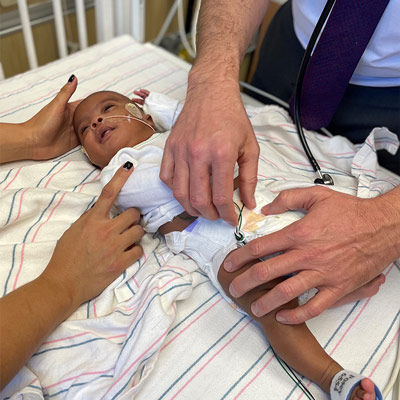When Jessamine Ghoston and her husband, Lakeith, found out they were pregnant in the Spring of 2021, they were elated. They had been wanting to grow their family and shower a little baby with love. Both Jessamine and Lakeith are deaf and knew they would face unique challenges with becoming first-time parents, but they weren’t quite prepared for what was ahead in their journey.
On Oct. 10, 2021, at 24-weeks gestation, Jessamine went into premature labor and gave birth to a 638 grams (1.4 lbs.) baby boy named Jaxon. Jaxon was born with a patent ductus arteriosus (PDA) heart defect. PDA is one of the most common congenital heart defects in extremely low birth weight babies. Small PDAs may not cause a problem, but a large PDA can lead to life threatening issues. This occurs when the blood vessel that is present in the fetal heart does not close following birth. This leads to increased blood flow to the baby’s lungs, making it more difficult to breathe.
“It was important to me that the Ghoston family knew they had options, and that we were going to take care of their baby,” said Saar Danon M.D., medical director, Pediatric Cardiology and Congenital Cardiac Catheterization, MemorialCare Miller Children's & Women's Hospital Long Beach. “We work closely with the entire Neonatal ICU team and always made sure that there was a sign language interpreter available, so they knew exactly what was going on with their baby and there was no miscommunication. We gave Jessamine and Lakeith the option of surgery or a minimally invasive procedure that is relatively new and involves cardiac catherization.”
The Ghostons opted for the less invasive choice. Dr. Danon along with his pediatric interventional cardiology colleague, Christopher Tan, M.D., performed a congenital cardiac catherization and implanted the FDA-approved device called the Amplatzer Piccolo Occluder, to close the PDA in Jaxon’s heart. Jaxon was the 10th patient that they performed this procedure on.
The Amplatzer Piccolo Occluder is a revolutionary device that is smaller than a pea and can be delivered into a patient's PDA through a small vein in the leg.
“We perform the procedure in the Children’s Heart Institute’s catherization laboratory,” explained Dr. Tan. “We use a combination of ultrasound and x-ray guidance to perform the procedure. Devices to close PDAs in the past were too large to be used in extremely low birth weight babies. Because the Piccolo device is so small, it can be used to perform the procedure in very small patients and improve the lives of fragile premature babies.”
Jaxon’s procedure was successful, and he remained in the Neonatal Intensive Care Unit (NICU) at Miller Children’s & Women’s Hospital to recover and continue to grow.
“Jaxon was so, so little when he was born he fit right in the palm of my hand,” said Jessamine. “I was very scared when I learned he had to undergo surgery, but I’m grateful that Dr. Danon presented me with an option that was less invasive for Jaxon. He doesn’t even have a scar today because the catheter was so small. I am forever grateful to Dr. Danon and Dr. Tan for taking great care of not only Jaxon but our whole family.”
 Five months after he was born, Jaxon was finally able to go home. He was discharged from the hospital on Saturday, March 5 weighing 9 lbs., 11.7 oz. He’s healthy and thriving, and mom and dad are excited to start their life at home with Jaxon.
Five months after he was born, Jaxon was finally able to go home. He was discharged from the hospital on Saturday, March 5 weighing 9 lbs., 11.7 oz. He’s healthy and thriving, and mom and dad are excited to start their life at home with Jaxon.
“We pride ourselves in taking a family centered approach when it comes to patient care here at the Children’s Heart Institute. We ensure that each baby and family gets the specialized neonatal and pediatric care that only a children’s hospital can provide,” said Dr. Danon. “The Ghostons are a special family, and I’m glad that Jaxon is now home so they can start the new chapter in their lives together.”

